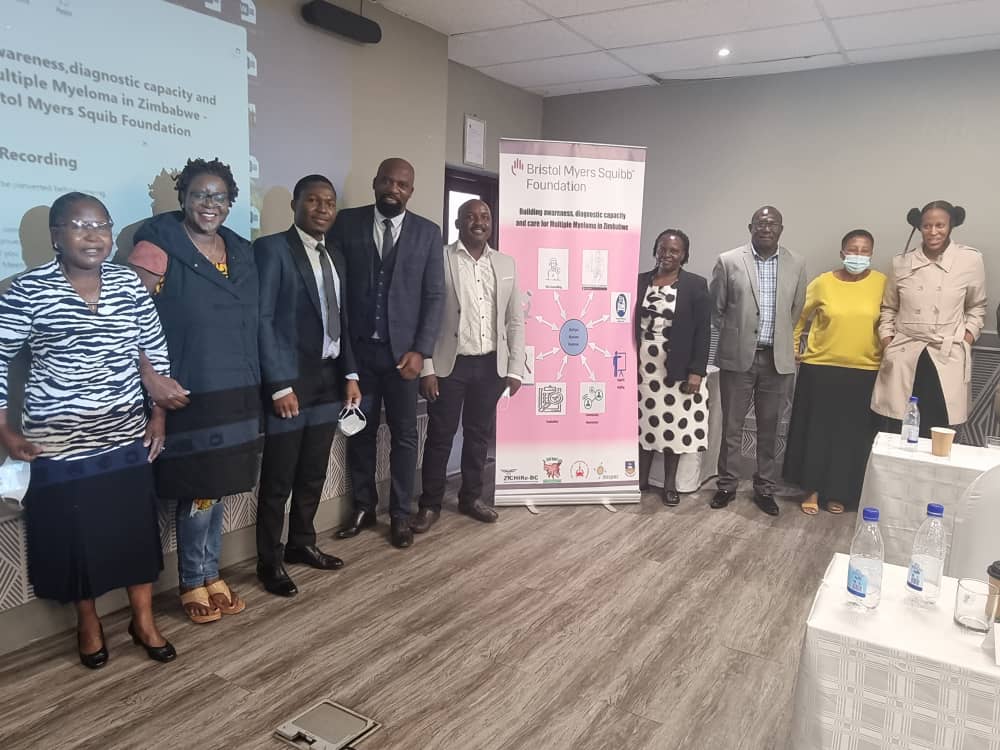|
Getting your Trinity Audio player ready...
|
The Zimbabwe Community Health Intervention Research (ZiCHIRe) is leading a consortium of organisations engaged in a project to address multiple myeloma in the country.
The Zimbabwean Consortium comprises ZiCHIRe, UZ Haematology Unit, Hospaz, Jointed Hands Welfare Organisation, and the Cancer Association of Zimbabwe (CAZ)
Speaking at an inception workshop on building awareness, diagnostic capacity, and care for Multiple Myeloma in Zimbabwe that was held at a Harare hotel today, Walter Chikanya, the ZiCHIRe Director said the project goal is to develop a comprehensive, sustainable, and data-driven multiple myeloma program in three provinces of Zimbabwe by 2023 which supports the Bristol Myers Squibb Foundation (BMSF) mandate to address cancer disparities in sub-Saharan Africa.
“We look forward to improved Multiple Myeloma service delivery systems, where patients efficiently and effectively get diagnostic and palliative care services as well as increased Multiple Myeloma awareness and knowledge levels among the general population and health workers of Zimbabwe.
“Coupled with the above objectives is the need to have improved access to high-quality, person-centered multiple-myeloma diagnostic, care, and support services through palliative care. There is also a need to elucidate the population demographics for multiple myeloma and factors that impact time to presentation and referral for therapy in myeloma patients in Zimbabwe by developing a secure web-based platform for reporting patients with suspected and confirmed multiple myeloma. We also look forward to standardizing the diagnostic workup of multiple myeloma in the three provinces under study by developing standard operating procedures (SOPs) for healthcare centers diagnosing multiple myeloma,” Chikanya said.
Dr. Mudavanhu, a Deputy Director in the Ministry of Health and Child care said the intervention will result in an increased number of patients with multiple myeloma being diagnosed and referred for therapy.
“This will lead to improved palliative care and health outcomes for multiple myeloma patients. We will also have additional specialist haematologists and we will have published research output in multiple myeloma from Zimbabwe (for the first time after more than 30 years),” Dr. Mudavanhu said.
The National AIDS Council Chief Executive Officer, Dr. Bernard Madzima applauded ZiCHIRe and its consortium for bringing the project to Zimbabwe.
“NAC has always been involved over the past seven years or so in the cancer response in Zimbabwe. We support MoHCC in the cervical cancer control and prevention program. We support KidzCan to deal with resource mobilisation for pediatric cancer supporting Ward A4 special. As NAC, we embrace that project that addresses multiple myeloma as blood cancer,” Dr. Madzima said.
Tawanda Dende from the Hospice and Palliative Care Association of Zimbabwe (HOSPAZ) said his organisation has in place the
appropriate training package on palliative care for immediate implementation.
What is Multiple Myeloma?
This is a blood cancer that affects specifically plasma cells, a type of white blood cell (WBC) found in the bone marrow and is responsible for making antibodies that help the body fight against infections.
What causes Multiple Myeloma?
The cause of multiple myeloma is not known, however, exposure to the following may lead to it:
– Exposure to certain agricultural chemicals such as defoliants and pesticides
– Solvents and fuels in engine exhaust and cleaning materials and radiations.
Who is at risk of getting Multiple Myeloma?
Age: above 40 years and above
– Gender: men than women
– Lifestyle: overweight or obese people
– Occupation: people working in petroleum-related industries
What are the symptoms of Multiple Myeloma?
– Renal failure
– Anemia: shortness of breath, dizziness
– Back pain – Fatigue
– Bone pain, bone fractures, or bone weakness
– Recurrent infections
Is Multiple Myeloma Curable?
No, there is no cure for multiple myeloma, however, there are treatments given to help manage this disease. The goal of treatment is typically to prolong life and improve one’s quality of life.
Treatment for Multiple Myeloma Can:
– Slow the growth of myeloma cells
– Provide long periods of remission
– Relieve symptoms of pain, fatigue, or other symptoms






